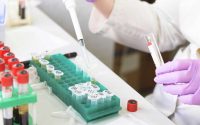Varicose veins: Five surprising symptoms which could indicate the condition
Chris Evans discusses the removal of his varicose veins
When you subscribe we will use the information you provide to send you these newsletters.Sometimes they’ll include recommendations for other related newsletters or services we offer.Our Privacy Notice explains more about how we use your data, and your rights.You can unsubscribe at any time.
Varicose veins occur when the valves in our leg veins stop working properly, meaning the blood falls down the veins when standing up, rather than flowing upwards towards the heart. In their simplest form, varicose veins can be identified as bulging veins which protrude from the legs however, half of varicose veins sufferers will show no overt signs of the condition, as many problematic veins remain hidden under the skin, until they get complications.
The damaged vein wall is caused by the stretching, and the reverse flow of the blood causes inflammation of the veins and surrounding tissue, and can cause bleeding and clots.
Research reveals approximately 30 percent of the UK population will develop varicose veins during their lifetime.
With this in mind, Professor Whitely, Founder of The Whiteley Clinic, revealed five symptoms that are often indicators of undiagnosed varicose veins:
1. Spreading veins that are blue or dark purple in colour
Often called ‘spider’ veins, ‘thread’ veins or ‘broken’ veins, these small veins are often thought to be ‘only cosmetic’.
But Professor Whiteley said: “Almost 90 percent of them have underlying hidden varicose veins – and will only cause stains or come back again if treated without sorting out the underlying cause first.”

2. Itchy, sore or dry skin over your veins
Many people remain unaware that dry or itchy legs can be an indicator of varicose veins, said Professor Whiteley.
He explained: “This is because varicose vein sufferers tend to experience varicose eczema which usually affect the lower legs, leaving the skin itchy and dry – called ‘venous eczema’.
“In cases where the skin is tender or sore, in the lower part of the leg, it can be a sign that the varicose vein condition has become more problematic and a venous leg ulcer is beginning to form.”
3. Hard tender lumps appearing under the skin
When blood in a varicose vein clots, it causes the vein to become a hard lump that is very tender to pressure.
If this is near the surface, the skin can be read over the top of it.
Professor Whiteley said: “This is often misdiagnosed by general practitioners or nurses as “infection” and they often give antibiotics which is quite wrong.
“This condition often known as ‘phlebitis’ needs a duplex ultrasound scan to check the clot is not near the deep veins and treatment of the inflammation and clot which might be blood thinners or nonsteroidal anti-inflammatory is and support stockings.
“To stop it happening again, the varicose veins or hidden varicose veins need to be treated.”

4. Yellow, red or brown stains around the ankle
Another key indicator of varicose veins or ‘hidden varicose veins’, is skin damage to the ankles which results in yellow, red or brown stains, known as hemosiderin.
Professor Whiteley advised: “Haemosiderin occurs when the blood refluxes the wrong way down towards the veins, causing chronic inflammation which turns the skin brown. Often the skin and underlying tissue can become inflamed and harder.
“If the underlying varicose veins are not treated, the skin damage will continue, and you could eventually develop a serious venous ulcer.”
5. Swollen, achy or heavy legs and ankles
If you notice your legs becoming tired, swollen, heavy or aching, it could be that you are suffering with varicose veins or hidden varicose veins.

Professor Whiteley advised: “We often see these symptoms worsen when those with varicose veins stand for long periods of time or experience hot weather which tends to increase the swelling.
“It’s important to note that not all sufferers will experience every symptom, however, if you do notice any of these symptoms appear, then my advice would be to go and see a venous specialist, like myself, who will arrange for you to have a venous duplex scan.
“This scan will tell the consultant whether there are any hidden problems and from here, they will be able to decide upon the best course of action.”
The Whiteley Clinic is now running a Covid-secure service in Guildford, London and Bristol, as well as virtual consultations, for those who might need urgent care for their veins. For more information about treatments offered by The Whiteley Clinic please visit: www.thewhiteleyclinic.co.uk
Source: Read Full Article


